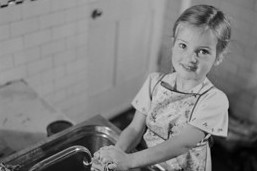
Picture a child of 8 or so. He wakes up and carefully makes his bed before going downstairs and emptying the dishwasher. He fixes himself a bowl of cereal and calmly eats it at the table, then clears his place, rinses the bowl and spoon, and places them both in the now-empty dishwasher.
想象一個八歲左右的孩子,早上醒來后先仔細整理好自己的床鋪,然后下樓將洗碗機中的碗碟拿出來,接著給自己沖上一碗麥片,坐在桌邊安靜地吃完,接下來清理餐桌,將碗勺洗沖干凈,放進已是空著的洗碗機內。
If this seems like some sort of mythical youngster from a faraway culture or a bygone age, you may be in the market for one of the parenting books smartly reviewed by Elizabeth Kolbert in this week's New Yorker. Summing up the point of both the books and the review, she writes, 'With the exception of the imperial offspring of the Ming dynasty and the dauphins of pre-Revolutionary France, contemporary American kids may represent the most indulged young people in the history of the world.'
如果在你看來,這個孩子虛幻得像一個來自遠古文明或某個逝去年代的年輕人,那么伊麗莎白•科爾伯特(Elizabeth Kolbert)這周為《紐約客》(New Yorker)就育兒書撰寫的精彩書評中提到的那些書籍,你很可能會樂意讀上一本。她在總結這些書籍和相關書評的要點時寫道:“除了中國明朝的皇子皇孫和法國大革命前的王儲,現在的美國小孩有可能是有史以來最嬌生慣養的年輕人。”
Kolbert describes an anthropologist's encounter with 6-year-old Yanira, part of a remote Peruvian tribe. On a leaf-gathering expedition with another family, Yanira constantly makes herself useful she sweeps the sleeping mats twice a day; she fishes for crustaceans, cooks them up and serves them to the others. 'Calm and self-possessed, Yanira 'asked for nothing,' ' Kolbert writes of the anthropologist's impressions.
在書評中,科爾伯特描述了一名人類學家遇到的秘魯一個遙遠部落的孩子雅尼拉(Yanira)。六歲的雅尼拉在和另一個家庭一起外出收集樹葉時,一直盡量使自己有用武之地──每天清掃睡覺的墊子兩次;捕捉甲殼類動物并將它們煮熟給同行的其他人食用。科爾伯特描述了這個女孩留給這名人類學家的印象:沉著冷靜,從不主動要求任何東西。
The same anthropologist was part of a family study in Los Angeles as well, with very different results. In those families, 'no child routinely performed household chores without being instructed to. Often, the kids had to be begged to attempt the simplest tasks; often, they still refused. 瞰In [one] representative encounter, an eight-year-old girl sat down at the dining table. Finding that no silverware had been laid out for her, she demanded, 'How am I supposed to eat?' Although the girl clearly knew where the silverware was kept, her father got up to get it for her.'
這名人類學家同時也參與了一個有關洛杉磯家庭的調查研究,但這些家庭的情況與秘魯部落的截然不同。在這些家庭中,“沒有孩子會在無人吩咐的情況下主動定期做家務。經常是你不得不求著他們去嘗試一些最簡單的活;更經常的是,他們還會拒絕。……一個很有代表性的案例:一個八歲的女孩坐在餐桌邊,發現面前沒有擺好銀餐具,她要求道,‘沒有餐具,我怎么吃呢?’盡管這個女孩很清楚它們放在哪里,但她父親還是起身給她取了過來。”
Madeline Levine's 'Teach Your Children Well: Parenting for Authentic Success' places much of the blame on parents' keen desire that their children be special in all things, Kolbert says. 'Being special takes hard work and can't be trusted to children,' writes Levine. 'Hence the exhausting cycle of constantly monitoring their work and performance, which in turn makes children feel less competent and confident, so that they need even more oversight.'
科爾伯特說,瑪德琳•萊文(Madeline Levine)在《教好你的小孩:真正成功的育兒之道》(Teach Your Children Well: Parenting for Authentic Success)一書中,將主要原因歸咎于父母認為他們的孩子與眾不同這樣一種熱望。“特殊,意味著需要更多的精力去照顧,同時你也無法信賴他們。這會形成一個讓父母精疲力竭的循環:你必須一直監督他們的工作和表現,這樣也會反過來使孩子們覺得自己并不怎么能干,沒有什么自信,從而導致他們需要更多的監督。”
Also reviewed in the piece are Sally Koslow's 'Slouching Toward Adulthood: Observations from the Not-So-Empty Nest,' Hara Estroff Marano's 'A Nation of Wimps: The High Cost of Invasive Parenting,' Melvin Konner's 'The Evolution of Childhood' and Pamela Druckerman's 'Bringing Up Bebe,' which was excerpted in the Journal and discussed here at the Juggle.
科爾伯特在文章中還評論了薩利•科斯洛(Sally Koslow)的《邁向成年:非空巢家庭之觀察》(Slouching Toward Adulthood: Observations from the Not-So-Empty Nest)、哈拉•埃斯特洛夫•馬拉諾(Hara Estroff Marano)的《弱者之族:入侵式家庭教育的高昂代價》(A Nation of Wimps: The High Cost of Invasive Parenting)、梅爾文•康納(Melvin Konner)《兒童的成長》(The Evolution of Childhood)、帕米拉•德拉科曼(Pamela Druckerman)的《養育孩子》(Bringing Up Bebe,此書節選曾刊登在《華爾街日報》上,并曾在“工作•家”(Juggle)欄目中討論)。
Our 7-year-old son and 10-year-old daughter aren't at the nasty level of Miss 'How Am I Supposed to Eat?' above, but my wife and I do get frustrated at their frequent unhelpfulness. They seem to think of simple household tasks as something they'll occasionally do as a favor or even for fun our son loves assisting with big housecleaning jobs, even as he never wipes his place at the table after dinner but thoughts/statements? like 'the garbage is full; I should take the bag out' have never, ever occurred to them independently. It's hard to know how to drill it into them now, but it's definitely something on our minds. I joke every now and then that we need to start giving the kids an allowance so we'll have something to take away from them if they misbehave.
我們家有一個七歲的兒子和一個10歲的女兒。他們雖然沒有那位“沒有餐具,我怎么吃”小姐那么糟糕,但我和妻子的確為他們經常袖手旁觀感到沮喪。他們會偶爾做做簡單家務,但似乎認為那是在給我們幫忙,或是好玩──我們兒子喜歡在房屋大掃除時搭把手,但他晚飯后從不會將他自己面前的餐桌清理干凈──他們從未主動想到或說到如“垃圾袋滿了,我應該把它拎出去扔了”之類的話。現在我們對如何將這樣的想法植入他們的腦袋束手無策,但無疑這是我們一直在思考的事情。我時不時地開玩笑說,我們應該開始給孩子零用錢了,這樣當他們行為不當時,我們就有可以從他們身邊拿走的東西了。












